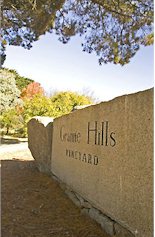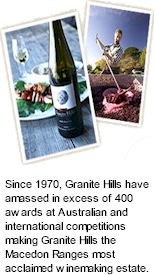


Granite Hills lies at the northern extremity of the Macedon Ranges wine region on Burke & Wills Track – the route taken by those famous explorers on their fateful journey north to the Gulf. The Knight family pioneered winemaking in the Macedon Ranges region - and since planting Granite Hills in 1970, have amassed in excess of 400 awards at Australian and international wine shows making Granite Hills wines the region’s most acclaimed.

Granite Hills winemaker is Llew Knight, son of the founders – Gordon and Heather Knight. Llew is a Wine Science graduate of Charles Sturt University, and a cool climate wine enthusiast. His winemaking philosophy is – to coax the most pronounced flavours from the classic varieties using a range of winemaking and oak management techniques, creating distinctive cool climate wine styles, marked by their complexity and aging ability.
The Granite Hills planting’s are the oldest in the Macedon Ranges region; their roots now well down into the old granitic sandy loam soils. It’s the good drainage and low fertility attributes of the soil at Granite Hills which is so beneficial to the balance of the vine, keeping the yields low and the quality of the grapes high. This ‘clean vineyard’ theme is also reinforced by the nature of the vineyard being very exposed to the prevailing winds - a factor which tends to lower humidity and therefore disease pressure as well as naturally limiting yields.
The Estate vineyard comprises 12 hectares of vines – 3 hectares each of Riesling and Shiraz, 2 hectares each of Chardonnay and Cabernet Sauvignon, One hectare of Pinot Noir, and an additional hectare made up of smaller planting’s of Merlot and Cabernet Franc. The ripening season at Granite Hills is long due to the southern latitude and altitude. This has the beneficial effect of allowing fruit characteristics to develop whilst still retaining good natural acidity. Vintage can continue into June in cooler years.

While its location places Granite Hills vineyard in a cool climate classification, careful management of the vines and moderation of grape yields, produce deceptively powerful and definitive varietal characters. Hand pruning and close attention to the management of the canopy allows for maximum penetration of sunlight to ripen the fruit, and selective hand picking is utilised to ensure only well ripened grapes enter the winery.
The focus at Granite Hills is to produce a select range of quality food wines. To show distinctive varietal and Regional characteristics, are well balanced, finely textured and structured to age over a 5 to 10+ year period. The philosophy is that "Great wines are made in the Vineyard". The approach in the winery is one of minimalist soft winemaking, utilising a mix of modern and traditional winemaking techniques. Only hand picked grapes are used. An elevated crushing system ensures that berries gently gravitate from crusher to press (whites) or to small open fermenters (reds). Not just gentle winemaking, this system leaves open options to many different winemaking techniques to optimise the character of all Granite Hills wines.
Llew Knight recognises the need for maturation of many cool climate styles – to allow their natural acids to soften, and their inherent flavours to develop and gain complexity. As a consequence, Granite Hills red wines spend up to 2 years in small oak before bottling, and are given some bottle aging before release. The white wines also, Riesling in particular, has shown over 29 vintages at Granite Hills, that it benefits from bottle development. In particular, the "cellar reserve" Riesling program winning 10 Trophies in Australian and International wine shows as a mature wine.
